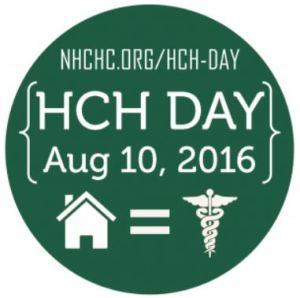By Noel Rees, Healthcare for the Homeless Network’s Community Planning and Partnerships Manager
Imagine you’re a physician or nurse helping someone with a medical problem, only to learn that your patient is living in a tent. That’s one real-life example from the Public Health clinic at Navos, where Nurse Practitioner Meredith Kriebel recently cared for a woman in her 20s who is camping in someone’s backyard.

Kriebel’s patient needed support to address her homelessness and other social issues – and the medical clinic staff typically finds it hard to squeeze all that into the medical visit.
Now, that’s changed, with the help of the Health Care for the Homeless Network (HCHN) and new Outreach Case Manager Jeremy Lemoine. For people experiencing homelessness in Burien, Lemoine is a “go to” person who helps provide that crucial but often unfunded “wrap-around care” – that is, care that allows people to get services that are hard to access if you don’t have transportation, identification, clothing or housing.
Lemoine is one of three new outreach case managers that have been added under the umbrella of the HCHN since November 2015. HCHN contracts with the REACH program, which is part of Evergreen Treatment Services, to provide chemical dependency outreach and reduce barriers to treatment. Lemoine and the two other new REACH outreach staff focus on helping three very different clinics better address the needs of their homeless clients.
Three new locations
In addition to Lemoine in Burien, REACH has added Mari Beth Wilson to Neighborcare Health’s Ballard Clinic team and Chloe Angus-Tibbetts to the team at Evergreen Treatment Services’ methadone clinic just south of downtown Seattle. All three of these new providers are funded by a federal Health Resources and Services Administration grant to expand access to substance use services throughout the network.
A chemical dependency professional by training, Lemoine joined the REACH staff and in January began working out of the Public Health Center co-located with Navos Mental Health and Wellness Center in Burien.
His role is flexible and looks different each day. He may transport someone to a medical appointment, help someone obtain an identification card, or drive someone to Goodwill to buy clothes for an interview.

Ultimately, his job is both to connect homeless clients to the medical clinic and help them reduce barriers to getting chemical dependency treatment, or at least reduce the risk of bad outcomes like overdoses or liver damage if they aren’t ready for treatment. He learns about their barriers, and he can reach out to people and make sure they’re okay.
“It’s nice to have a piece that I can hand off to Jeremy so I can stay focused on medical,” says Kriebel. “Jeremy talks to people in a humanizing way.”
A success story
A recent example illustrates how all this fits together. A developmentally disabled woman in her forties had been in and out of group homes and had long periods of being homeless. She was living on the streets, being taken advantage of for her social security money and was not taking her psychological medications. Medical staff at the Navos clinic couldn’t spend enough time with her to help her see the benefit of going back to a group home and taking her medications — but Lemoine could.
Even though finding housing is not his main job, he worked with two other agencies to help her secure a spot in a group home – because he knew that stability would be important for her treatment to be successful. When things at the group home got rocky, Lemoine went out as a case manager and mediated. He reassured the woman that he and the Public Health staff “are still here for you.” She remains housed and is receiving substance and mental health treatment from REACH and Navos.